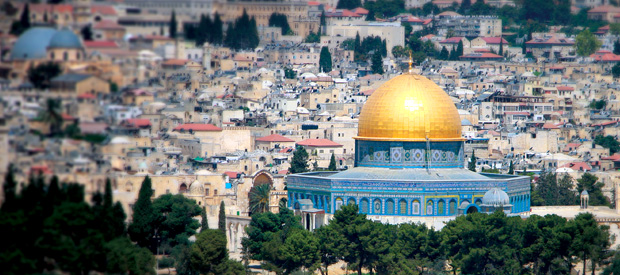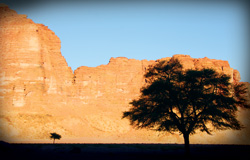Law in the Holy Land
Dean Ken Starr and Professor Sam Levine Teach Jewish, Christian, and Islamic Legal Traditions in Israel.
“As a country and a society, Israel works to reconcile a number of characteristics that seem to be in tension with each other,” says Sam Levine, professor of law at Pepperdine. “Israel is a secular, Jewish state. It’s also a secular democracy, which means that citizens have religious freedom.”

In this unique setting, amid the myriad complexities of law and religion, Levine and Ken Starr, the Duane and Kelly Roberts Dean of the Pepperdine School of Law, taught a course this summer on Jewish, Christian, and Islamic legal traditions. They were joined by Shuki Friedman, an Islamic law scholar at Bar-Ilan University in Ramat-Gan, a suburb of Tel Aviv, Israel.
The course was part of a summer-in-Israel program sponsored by the Pepperdine School of Law and Whittier Law School, and hosted at Bar-Ilan University School of Law during the month of July. In its sixth consecutive year, the program welcomed more than 40 students representing more than 20 law schools and many different faith traditions. Under the direction of former Pepperdine adjunct professor Michael Bazyler, it is the largest and longest-running ABA-accredited summer program in Israel. “The students’ backgrounds were so varied,” says Levine. “We had students from all three of these religious traditions, as well as some who were not, and they all contributed to the conversation.”
 The place known as the Holy Land is predominately Jewish, yet several minority religious
groups—including Muslims, Christians, Druze, Samaritans, and others—continue to have
a presence in the country. Israel gives great deference to religion—not just to Jewish
law, but to all religious authorities. Because the Israeli Supreme Court defers to
religious tribunals, these tribunals have legal authority. Because they have legal
authority, their decisions are subject to review by the Israeli Supreme Court.
The place known as the Holy Land is predominately Jewish, yet several minority religious
groups—including Muslims, Christians, Druze, Samaritans, and others—continue to have
a presence in the country. Israel gives great deference to religion—not just to Jewish
law, but to all religious authorities. Because the Israeli Supreme Court defers to
religious tribunals, these tribunals have legal authority. Because they have legal
authority, their decisions are subject to review by the Israeli Supreme Court.
Immersed in this context, Levine, who is a Jewish law scholar and holds a rabbinical ordination, first began teaching in the program in summer 2007. This year he and Bazyler had the idea to combine Jewish, Christian, and Islamic legal traditions all in one ambitious seminar course. Three religious traditions would be discussed in a legal setting using legal analysis. They brought on board two top scholars: Starr to teach Christian legal traditions and Friedman to teach Islamic legal traditions.
Drawing from his vast scholarship, including more than 40 law review articles, Levine gave a substantive overview of areas of Jewish law and applied them to American law. One of his goals for the course was to dig into topics of importance to law students that they may not have explored in detail in any other law class, such as self-incrimination and the death penalty.
Jewish law is very specific about self-incrimination. “Jewish law bars using confessions as evidence against a criminal defendant,” explains Levine. “There is the notion that when someone admits to committing a crime, it’s not as simple as it looks. They might be confused or covering for someone else, or they might be convinced they are better off this way.”
Illustrating how Jewish law can impact American law, Levine cites the landmark Supreme Court case Miranda v. Arizona. The case centered on criminal confessions offered in response to interrogation by police. “This was the biggest Fifth Amendment case in history,” Levine says. “Chief Justice Earl Warren, who delivered the opinion of the Court, referenced Jewish law both in the text and in a footnote.” The Court ruling provided the foundation for the American Miranda rules, which ensure defendants are informed of their rights.
“By the end of the discussion, a lot of students were concerned about the use of confessions in the American criminal justice system because they understand the problem of false confessions,” says Levine.
In Starr’s sessions, discussions focused on the wide range of Christian legal traditions. “We drew from two millennia of Christian thought, beginning with the New Testament through St. Augustine, Thomas Aquinas, and the outpouring of thought in both the Protestant Reformed tradition and modern Catholic teaching,” says Starr.
Class discussion focused on the relationship of the individual to the state. “We would come back to the teachings of Jesus and the Pauline epistles about duty to the state,” says Starr about the topic that incited the most dialogue. “We focused on ‘render unto Caesar what is Caesar’s.’ Well, really? Under all circumstances? What about those who became an instrument of the Holocaust? In the Acts of the Apostles, Peter says in response, ‘We must obey God rather than man.’”
“It was a unique perspective for students to hear from a leading Supreme Court advocate who is a scholar on church/state issues,” Levine says of Starr, who commented on cases that he argued at the Supreme Court and others that he heard as a judge on the D.C. Circuit Court of Appeals. “He was able to take theoretical, high-level theological discussions and relate them to the way judges actually decided real cases in which he was involved, on both sides of the bench.”
Students also had the opportunity to learn from Friedman, one of Israel’s emerging Islamic law scholars. The class reviewed the constitution of modern Egypt and the Islamic attitudes toward religion and state. “This issue raised great interest because of its relevance to political Islam, its influence on the West, and the relations between religion and state in other countries like Israel and the U.S.,” says Friedman.
Third-year law student Steve Vondrak appreciated the diverse perspectives of the students and professors. “By taking on this subject matter in a legal setting, many of the emotions and politics normally associated with religious differences were left at the door,” he says. To describe the experience of teaching religious legal traditions in Israel, Starr tells a story. “After going to church on Sunday, we walked back to our hotel by an Islamic mosque right on the Mediterranean in Tel Aviv,” he says “In a Jewish state, we went to church and visited a mosque. To me it was a parable of a broad truth that people need to understand about Israel: it is a country of freedom.”
UPCOMING Leading voices in the Christian, Muslim, and Jewish communities will come together on November 2 as the Diane and Guilford Glazer Institute for Jewish Studies at Pepperdine University hosts its inaugural conference, “Finding Common Ground: Reconciliation Among the Children of Abraham.”
